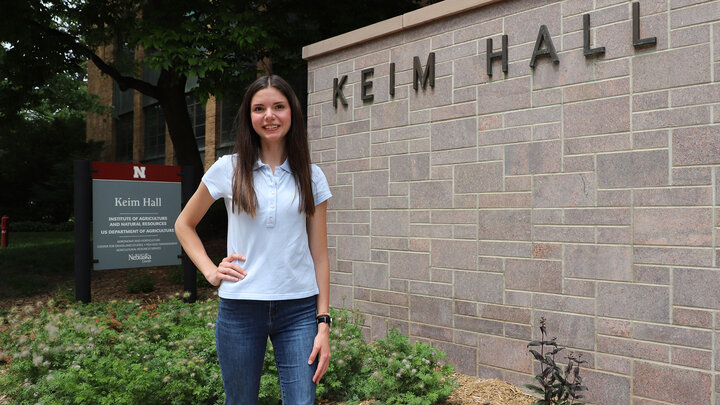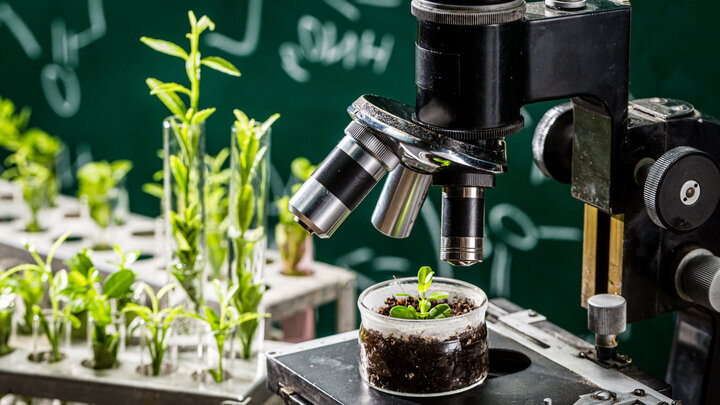Luis Gerardo Alejandro Posadas Martinez, a University of Nebraska–Lincoln research assistant professor in agronomy and horticulture, has been developing molecular tools for the use of marker assisted selection in soybeans, among other things, and works in Nebraska’s Soybean Breeding Program with George Graef, professor and presidential chair in soybean breeding.
This year, Posadas Martinez and Graef engaged with the university’s First Year Research Experience program through Career Services because they wanted to offer students hands-on experience in their lab.
“We want to foster an academic culture with a strong sense of belongingness and help with undergraduate student retention,” Posadas Martinez said. “Our first FYRE student turned out to be an amazing fit for our lab.”
The student, Gabrielle Clifton, is an agronomy major finishing her sophomore year of classes this May on East Campus.
Originally from Columbia, Missouri, Clifton graduated from Battle High School in 2023 with highest honors. She was a member of her local FFA chapter, where she excelled in career development events, competing at the state and national levels. After graduation, she spent the summer in a USDA greenhouse lab centered around corn rootworm.
Clifton didn’t grow up on a farm, but she was introduced to the agriculture industry through her involvement in FFA. In her senior year of high school, she chose to participate in FFA Career Development Events focused on agronomy.
Looking for a college to attend, Clifton visited Nebraska and liked Lincoln’s vibe — something between a small town and a larger city that she found interesting. She was also intrigued by the College of Agricultural Sciences and Natural Resources, particularly the agronomy major.
“I liked how East Campus offered all the opportunities of a large university but felt like a small community,” Clifton said.
She decided to apply to the FYRE program before starting her first semester in the fall of 2023.
The FYRE program is designed for full-time, degree-seeking, first-year students who qualify for work-study. Through this program, students receive Federal Work Study awards to support a job focused on research or creative activities under the guidance of a faculty mentor. Participants are employed by the Office of Undergraduate Research & Fellowships or the TRIO/Student Support Services program and assigned to an undergraduate research assistant position on campus. FYRE students commit to working 5-10 hours per week on their projects throughout the academic year and are compensated with an hourly wage.
Clifton worked as a breeding program lab assistant in Nebraska’s Soybean Breeding Program where she was able to work with soybean DNA isolation and concentration protocols, gain knowledge about the complex inner workings and processes of the soybean breeding program as well as learn how to do data curation. This experiential learning opportunity has given her valuable skills and broadened her knowledge of plant breeding and potential career paths.
“By engaging in the FYRE program, we weren’t mentoring students in the pursuit of a specific scientific question along with the production of specific knowledge to answer that question,” Posadas Martinez said. “But rather, we leveraged the industry-like resemblance of our production genotype lab to provide students with a meaningful overview of what a plant breeding program is, how it works and how we use molecular tools in order to provide valuable information that has an impact on crop genetic improvement.
Clifton helped generate important biological data for a number of projects in the lab through the fall of 2024.
“It’s really a team-effort what we do in the lab and all players need to have the same level of skills in order to play our game,” Posadas Martinez said. “Surprisingly, Gabrielle was able to learn our DNA isolation protocols fast and developed reliable pipetting skills despite not having any prior experience. She even helped us set up a little experiment to troubleshoot an anomaly we observed when operating a new centrifuge piece of equipment we received last year.”
Toward the end of her research work in the soybean breeding program, Clifton shared that an important skill she developed in the lab was the ability to pace herself with the lab’s molecular type of work.
“Gabrielle developed a strong attention to tiny, yet important details and was exposed to a multicultural environment which she believes will be of great benefit to her,” said Posadas Martinez. “She is mature beyond her years.”
Clifton said she is grateful for the mentorship and support the program has given her.
“Throughout the rest of my college career, I want to continue to take advantage of meaningful opportunities so that I can continue to grow personally and professionally,” she said.
Clifton secured a summer internship as a field research intern at Corteva Agriscience in York, Nebraska. She will begin work on May 20 on seed product development in research and development.
“I believe, if she chooses to pursue a career in science, we would all benefit from it,” Posadas Martinez said.




